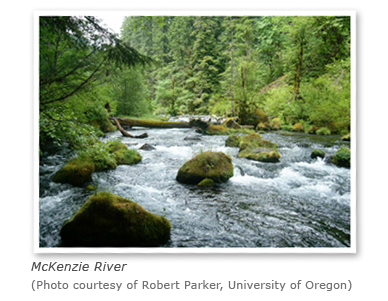The Eugene Water and Electric Board (EWEB) is dedicated to protecting its sole source of drinking water, the McKenzie River. In order to provide its 200,000 customers with consistently high quality water at low cost, it identifies long-term threats to water quality and plans for mitigating those threats.
In 2009, EWEB analyzed information obtained from studies of watershed land use and from extensive monitoring of water quality. It identified increasing development along the McKenzie River as a likely source of declining water quality and projected this threat to increase over the next several decades.
EWEB plans to counteract this threat by promoting healthy riparian areas through its new Voluntary Incentives Program (VIP). Riparian areas are those areas adjacent to rivers that, when healthy and filled with native trees, shrubs, grasses, and forbs, naturally reduce pollutants entering the river. Because the ecosystem provides this filtration service at no charge while actually reducing the downstream cost of providing municipal water, public utilities have an interest in encouraging landowners to maintain high quality riparian areas.
The VIP's incentive-based approach evolved from a stifled regulation-based approach. In 2010, Lane County, with input from EWEB, developed a setback ordinance that would require a 200-foot riparian buffer zone between the river and property development. When the ordinance was brought before the public, landowners quickly condemned it. EWEB Source Water Protection Coordinator Karl Morgenstern explains:
Property owners rebelled, so to speak, and what they said in hundreds of letters and comments was, “You're beating us all over the head with the same stick, even if we're good stewards on the land, or if we're not. So why don't you just reward the good stewards?” And we said, “All right, we'll try that.” That moment triggered that it may be something we can work with landowners on, the concept being: let's reward the good stuff and promote people to be good stewards.
EWEB subsequently developed the VIP to protect the McKenzie's riparian areas in partnership with landowners. In Morgenstern's words, “Our program is designed for those homeowners who have healthy riparian forests. We want to reward them with what we're calling dividend payments on that natural capital in return for their agreeing to protect that area for a long period of time.” As envisioned, EWEB will enroll interested landowners whose riparian lands meet certain criteria for quality. Enrolled landowners will receive annual compensation, or dividends, in return for the services their healthy riparian areas provide for natural water filtration. These dividends will come from a fund expected to be sustained by a combination of rate payer fees, corporate sponsorship, and development mitigation fees. Several partner organizations will be involved with the valuation, financial administration, and monitoring aspects of the program. EWEB estimates 6,500 acres will be included initially under the program's purview.
This is a novel approach to source water protection. While some programs provide financial assistance or rewards for restoring riparian areas, EWEB is pioneering by designing a program that pays landowners for the dollar value it recognizes in existing healthy riparian areas. “We just haven't had those payments for good stewardship,” explains Keli Kuykendall, executive director of Cascade Pacific Resource Conservation and Development, a partner organization. The VIP's approach has the potential to spread benefits throughout the watershed. Landowners will benefit most directly in the form of financial compensation, but utility customers will benefit from tempered future water rate increases. EWEB hopes that the intangible benefits of supporting the watershed community will flow as well.
Read on to learn more about the Voluntary Incentives Program from the perspectives of Karl Morgenstern, Keli Kuykendall, and Craig Burns, a McKenzie River landowner. You can also learn more about ecosystem services and the McKenzie River Basin.

